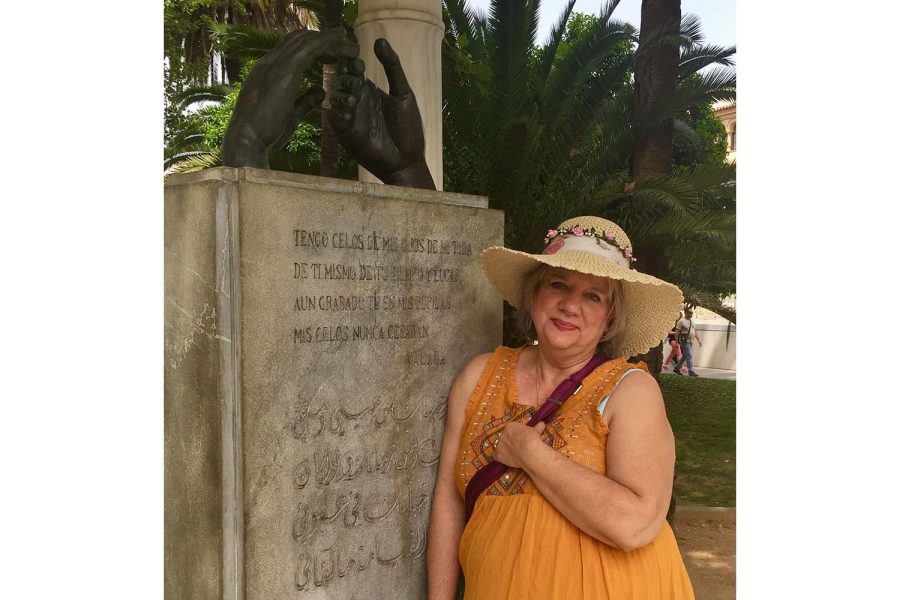UI alum and language facilitator publishes novel on voyage to Spain
Corinne Stanley, a University of Iowa Spanish alum and the UI’s former language and culture facilitator, published her latest book, ‘La Tercera Luz: A Poetic Journey Through Spain.’ The author held a launch for the emotion-driven novel on July 21 at MERGE.
Contributed photo of Corinne Stanley, an Iowan writer and educator, who held a reading of her latest work, “La Tercera Luz: A Poetic Journey Through Spain,” on July 21 at MERGE, IC.
July 26, 2022
Corinne Stanley, an Iowan writer and educator, held a reading of her latest work, “La Tercera Luz: A Poetic Journey Through Spain,” on July 21 at MERGE, IC. The room was decorated with bright collages and art pieces, and numerous other handmade odds and ends — it was bustling with people, who, as Stanley stated, “were meant to be there.”
The author herself was dressed in a silvery, flowing gown and ushered guests in with open arms and a radiant smile. She urged attendees to walk around the room and check the artwork out, adding that twenty percent of all earnings from these items would be donated to Ukraine.
Before beginning the reading, Stanley spoke of the significance of the venue. As the former language and culture consultant at the University of Iowa, Stanley said she is well aware of the challenges of cross-cultural interaction.
“I have taught and worked with many different cultures. I definitely feel Iowa City has offered many insights, particularly since I have interacted with various cultures over the years,” Stanley said. “Also, one develops a significant humility when you live in a place where you are not the dominant culture or class.”
MERGE, she felt, was a place established with the intention of facilitating such interactions; it represented Iowa City’s relentless efforts to be cosmopolitan. Conducting her reading at this place was Stanley’s way of thanking a community that, as she expressed, had been very supportive of her literary endeavors.
“So many people pitched in to help me with the event, and that is why I felt it was a community event. MERGE recognized this, and gifted me with the space,” she said.
RELATED: ‘Nightbitch’ author Rachel Yoder to speak at Prairie Lights
Stanley noted that the book itself is the product of her recent voyage to Spain in search of her roots, of her fading passion for writing, and of personal meaning. After undergoing a cascade of deeply emotional crises, including surviving a bout of cancer and the death of her mother, Stanley said she was awakened with a need to go on the journey.
Lea Ramsdale, a close friend of Stanley for over twenty years, said that she watched Stanley evolve as a writer, and declared the work to be Stanley’s masterpiece. She described “La Tercera Luz” as “a book that resisted categorization.”
“It is, at once, a memoir, a history, an autobiography, and so many other things, but, above all, it is poetry,” Ramsdale said.
Ramsdale felt that in the book’s sensory imagery, there is a persistent effort to “dig away beneath the veneer” and bring “the essence of things into the light.”
Stanley’s involved, sincere reading mesmerized her audience. Stanley chose to display photos of her time in Spain as she read, shrouding the event with an aura of solemnity and sanctity, enabling the audience to listen more intently.
A large portion of the book revolves around Esther Bendala Pavon, a poet Stanley met and developed a strong bond with while in Spain. Stanley described Esther as a sister-poet as she felt a deep kinship with her.
“Like Esther, I wrote from a very young age,” Stanley said. “I had suffered from cancer and written about it, and later, my heart disease. I could relate to her single lifestyle, and I think by translating her work, I became very close to her.”
Pavon died of brain cancer in September 2018. When Stanley met Pavon, the latter was living her final few years. While writing “La Tercera Luz,” Stanley undertook the task of translating and publishing a few of the thousands of poems Pavon had written in her lifetime. As a result of Pavon’s importance in the novel, and its close connection with the volume of Pavon’s poetry, Stanley said, “La Tercera Luz” developed a significance as paying homage to Pavon’s battle with cancer and the loss her death was to the literary community.
Gabriella Rivera, another close acquaintance of Stanley, emphasized her gratitude toward Stanley for sharing the traumatic experience that cancer was in a way that soothed others struggling against the same disease. Rivera was also touched by the Catholicism that pervaded the book.
“As a Catholic, I believe things happen for a reason,” Rivera said, “I’ve known Corinne a long time, and learned of her interactions with Esther before this reading. I am so impressed that this book honors the pain of cancer. I’m so glad the book came out before [Esther] died.”
Stanley concluded the reading by speaking about how universal these experiences from her journey were, and how “important it is for writers to put it all out there.”
A murmur of agreement rose in the room as attendees began to speak about how wonderful the event had been. It was evident the event turned out to be epiphanic and cathartic not only for the author, but for everyone present at the reading.



